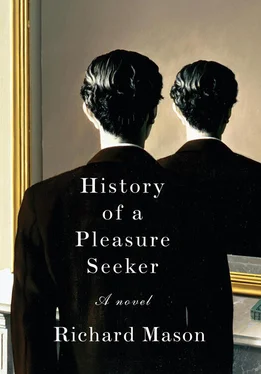His great-aunt’s entrance hall floor loomed before him. He switched on a light. He had spent hundreds of hours navigating this treacherous terrain and remembered the shame of such journeys; then Piet Barol’s calm courage and his masters’ inability to punish it.
He held his breath and ran.
Hilde Wilken was aware that Louisa Vermeulen-Sickerts had no great affection for her, and she did not trust her motives. Her first thought, on receiving Louisa’s gifts, was that she should spirit them from the house before they were countermanded. But where could she store such clothes? They would test the honesty of the truest friend and Hilde did not have any friends in Amsterdam. An afternoon off every fortnight did not leave her much time to make them. She decided, finally, to put her faith in the Baggage Store of the Central Station.
The morning of Egbert’s bid for freedom, Hilde rose early too. As he was dressing, she was folding his sister’s clothes as tightly as she could and putting them into a sack. She could not carry a trunk unaided and had no money for a hired carriage. When she had laid the table for Maarten’s breakfast and set fires in his office, the kitchen, the drawing room and the dining room, she told Mr. Blok that Mrs. de Leeuw had an errand for her, and Mrs. de Leeuw that Mr. Blok had one; and in order to escape the prying eyes of the servants she left Herengracht 605 by the front door.
Hilde was not used to sudden good fortune. She ran the whole way to the station, possessed by a superstitious certainty that something or someone would snatch it away. But nothing and no one did. She hired a locker and deposited her haul in it. She obtained a ticket and a receipt. If Mrs. Vermeulen-Sickerts demanded the return of her daughter’s possessions, she could now say she had sold them. She walked back to the Herengracht. Mist was rising from the canals and the cold inhibited their stench. It was a sparkling winter’s day. You may have found a husband, Agneta Hemels, she thought, but you’ve missed the chance of all this.
Egbert reached the schoolroom. From the shadows came hysterical hissing. He silenced it by switching on the lights. He went to the piano. On the music stand was the edition of Chopin Piet had bought him, which opened like an invitation at the fourth ballade.
The boy sat on the stool, resolved to play it come what may. His aunt’s piano had known less tedious masters than Egbert. As his hands stretched in the opening octaves, its strings quivered in recognition and joy. He had never heard the ballade before, but its opening soothed his fear and beckoned him from the Bach-like maze in which he had wandered for so long. The tune prepared him for adventure. When it slipped away only to return, embroidered as finely as any garment of Louisa’s, he had to search in the mass of notes to find it.
Once grasped he did not let it go. His fingers went faster or slowed down as the music led him; he obeyed no regimenting discipline but began to delight in his skill. As the page filled with notes, he was astonished by what he could do — for the sound his hands and feet produced was one of transcendent beauty.
When he had finished, he knew for the first time that there is value even in the darkest sorrow. He stood up. He went to the drawer in which his aunt’s front-door key was kept and removed it. Then he took his grandfather’s signet ring from its box and picked up his collected Bach. Without hesitation, he crossed the hall and let himself out onto the street.
So many unusual things had happened to Hilde Wilken since the previous afternoon that the sight of Egbert Vermeulen-Sickerts throwing a music book and a gold ring into the water from the Utrechtsestraat was almost unremarkable. At first she barely registered what she was seeing. When she did, she hurried closer. The boy was standing on the bridge, his face shining in the morning light. Was he a ghost? She crossed herself and crept closer.
“Good morning, Hilde.”
“Good morning, Master Egbert.” Hilde was too astonished to curtsy. For the first time she was not afraid of this little boy.
“It is a very pleasant morning, is it not?”
“Indeed it is.” Hilde could not help herself; she leaned forward to touch him.
“I am quite real, I assure you.”
And this was confirmed by the warmth of Egbert’s skin.
Hilde ran into the drawing room without knocking and spoke without curtsying. “Oh, madam! Master Egbert is outside!”
“Whatever can you mean, Hilde?”
“I have spoken to him.”
“Are you sure?”
“I am certain, madam.”
“Call my husband at once.” Jacobina went to fetch a cloak; then thought better of it and ran down the stairs.
Maarten was in his office. It was now his habit to spend three hours each morning in prayer. At the tinkling of the silver bell he rose painfully. Hilde’s breathlessness annoyed him, but as he listened he saw that proof of his salvation had come at last. Finally he understood the purpose of his recent sufferings. By forcing him to renounce vanity, God had prepared him for a gift greater than riches returned: the glory of a son like other sons.
He too ran down the stairs and into the street.
Piet Barol had been searching halfheartedly for his pupil for an hour, and it was Didier Loubat who conveyed the extraordinary news. By now the entire household had learned it. This meant that when Egbert turned the corner of the Herengracht, the nine people who had witnessed his years of failure and confinement were there to celebrate his triumph.
It was Mr. Blok who sounded the first cheer, and Monsieur la Chaume who lustily seconded it. Maarten Vermeulen-Sickerts began to run. He had not run for many years and it was fortunate that his son was not very far away. He reached him a moment after Jacobina did and picked him up and embraced him. Then he burst into tears, not caring a damn who saw.
Egbert completed the journey to his home smiling shyly, but inside he felt like a hero. He was ravenous with hunger and consumed an enormous breakfast. When it was finished a delicious heaviness stole over him, quite unlike the exhaustion that had succeeded his journeys across his great-aunt’s entrance hall floor. With his head against his father’s shoulder he fell into a deep doze at the dining room table.
“Let him sleep as long as he likes,” said Piet, with the authority of a staretz . “When he wakes, he will be cured.”
Egbert did not wake until midmorning of the following day, and when he did his father took him out and bought him half the contents of a toy shop. They returned from this expedition in great good humor and had an excellent lunch. As soon as it was over, Maarten went to his office and called for Piet Barol.
“Mr. Barol!” He leaped to his feet and embraced him. He had not been so excited since the day of Egbert’s birth. “You have achieved what I had begun to fear was impossible. How ever did you manage it?”
“The credit is Egbert’s alone, sir.”
“Don’t be so devilish modest. Sit down and tell me all about it.”
Piet sat, but he had already decided to preserve his pupil’s confidence. “All that was wanted was patience and sympathy and”—with sudden inspiration—“prayer.” He inclined his head. “The Lord God Almighty has intervened here.”
This was exactly the right thing to say. In a locked drawer of his desk Maarten had a large gift of money for Piet Barol, but the young fellow’s piety demanded greater recognition. He glanced around his office and his eye fell on the miniature of the man on a tightrope. He hesitated. It was the jewel of his silver collection, worth twice what he had paid for it to say nothing of the luck it had brought him over twenty years. “My dear man.” He pressed it into Piet’s open hand. “You have given me back my son. I should like you to have this. And this.” He unlocked the drawer and took out an envelope promisingly swollen with cash. “Let me say that should you wish to work for me in a more dignified, better remunerated position than the one you currently occupy, you need only say the word.”
Читать дальше












